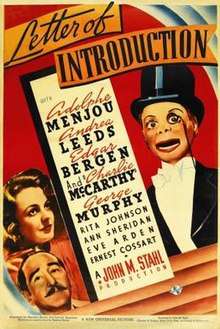Letter of Introduction
Letter of Introduction is a 1938 American comedy-drama film directed by John M. Stahl.
| Letter of Introduction | |
|---|---|
 | |
| Directed by | John M. Stahl |
| Produced by | John M. Stahl |
| Written by | Sheridan Gibney Leonard Spigelgass |
| Screenplay by | Bernice Boone |
| Starring | See below |
| Music by | Frank Skinner |
| Cinematography | Karl Freund |
| Edited by | Ted J. Kent |
Production company | Universal Pictures |
| Distributed by | Universal Pictures |
Release date |
|
Running time | 104 minutes |
| Country | United States |
| Language | English |
| Budget | $1.1 million[1] |
In 1966, the film entered the public domain in the United States because the claimants did not renew its copyright registration in the 28th year after publication.[2]
Plot
An aging actor, John Mannering, is surprised when his estranged daughter, Kay Martin, shows up. She is an actress trying to succeed on Broadway. He is persuaded to perform on Broadway for the first time in twelve years in a play with her. He is anxious about his performance, so turns to alcohol to overcome his self-doubt. He tries to re-establish his relationship with his daughter while trying to hide from the press that she is his daughter.
Cast
- Adolphe Menjou as John Mannering
- Andrea Leeds as Katherine "Kay" Martin
- George Murphy as Barry Paige
- Edgar Bergen as himself
- Rita Johnson as Honey
- Ann Sheridan as Lydia Hoyt
- Ernest Cossart as Andrews, the Butler
- Frank Jenks as Joe, theatre prompter
- Eve Arden as Cora Phelps
- Charlie McCarthy as Himself - dummy
- Mortimer Snerd as Himself - dummy
- Ray Walker as Reporter
gollark: Internet connection *required*? Huh.
gollark: I think it has a Levenshtein automaton thingy but I'm not sure if it does what you need.
gollark: https://lib.rs/crates/fst or some similar thing perhaps?
gollark: Java is mandatory-OOP, garbage collected, and runs on a VM.
gollark: Not that? They're quite different.
References
- Dick, Bernard K. (2015). City of Dreams: The Making and Remaking of Universal Pictures. University Press of Kentucky. p. 116.
- Pierce, David (June 2007). "Forgotten Faces: Why Some of Our Cinema Heritage Is Part of the Public Domain". Film History: An International Journal. 19 (2): 125–43. doi:10.2979/FIL.2007.19.2.125. ISSN 0892-2160. JSTOR 25165419. OCLC 15122313.
External links
- Letter of Introduction on IMDb
- Letter of Introduction at Rotten Tomatoes

- Letter of Introduction is available for free download at the Internet Archive
This article is issued from Wikipedia. The text is licensed under Creative Commons - Attribution - Sharealike. Additional terms may apply for the media files.